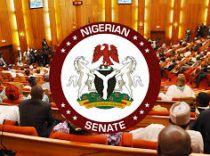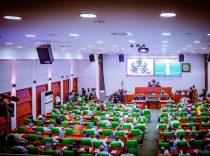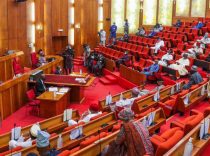The House of Representatives, in July 2020, passed the National Water Resources Bill, 2020, which seeks to provide equitable and sustainable development of water resources as well as regulating its use, management and conservation. This bill is however being criticized for seeking to bring all water resources (surface and underground) and the banks of water sources under the control of the Federal Government through its agencies to be established by the Bill. Many have also expressed concerns that it will stifle the riparian rights of the littoral states of Nigeria.
The National Water Resources Bill was first introduced in the 8th National Assembly by the President, Muhammadu Buhari. In a letter dated, 11 April 2017, the President informed lawmakers of his decision to forward the Bill to both Chambers for consideration and passage. Although the Bill was passed in the House of Representatives, its consideration for passage was suspended at the Senate’s plenary session of Thursday, 24 May 2018, after lawmakers expressed dissenting views over section 2 (3) and (4) of the bill, which dealt with Public Trusteeship of Water during the deliberation of the report on the Bill presented by its Committee on Water Resources. These provisions stated that:
“ (3) The right to the use, management and control of all surface water and ground water affecting more than one State pursuant to item 64 of the Exclusive Legislative list in Part 1 of the Second Schedule to the Constitution of the Federal Republic of Nigeria, 1999 as amended, and as set out in the First Schedule to this Act, together with the beds and banks, is vested in the Government of the Federation to be exercised in accordance with the provisions of this Act”.
“(4) As the public trustee of the nation’s water resources the Federal Government, acting through the Minister and the institutions created in this Act or pursuant to this Act, shall ensure that the water resources of the nation are protected, used, developed, conserved, managed and controlled in a sustainable and equitable manner, for the benefit of all persons and in accordance with its Constitutional mandate”.
In view of this, the President of the 8th Senate, Sen. Bukola Saraki (APC: Kwara) requested that the Bill be referred back to the Committee, which was chaired by, Sen. Ubali Shittu (APC: Jigawa) for further legislative scrutiny. However, the Committee report was not re-considered before the termination of the 8th Assembly in 2019.
On Tuesday, 7 July 2020, the Bill was re-introduced in the 9th House of Representatives by Hon. Sada Soli (APC: Katsina). It was re-considered on Thursday, 23 July 2020 pursuant to Order Twelve (12), Rule 18 of the Standing Orders of the House of Representatives which states that:
“ The Legislative businesses of the House though completed and laid by a Committee of the House which remain undetermined at the end of the Assembly, shall be resumed and proceeded with in the next Assembly in the same manner as if the tenure of the Assembly had not come to an end, if the House resolves in the affirmative that such Bills, upon being re-gazetted, be reconsidered in the Committee of the Whole without being commenced de-novo”
According to Hon. Abubakar Hassan Fulata (APC: Jigawa) who moved for the re-consideration of the Bill, the said Bill was passed by the preceding Assembly and forwarded to the Senate for concurrence, but no concurrence was made, neither was it sent to the President for Assent before the end of tenure of the preceding Assembly. The Bill was further re-gazetted as HB 921 and referred to the Committee of the Whole and eventually passed. It is to be forwarded to the Senate for concurrence.
Quick Overview
The Bill is aimed at ensuring that the nation’s water resources are adequately protected from degradation and pollution in order to enhance citizens’ rights of access to clean Water, Sanitation and Hygiene (WASH). Some of the highlights of the Bill, include the establishment of a
National Council on Water Resources; a Nigeria Water Resources Regulatory Commission; a River Basin Development Authorities; a Nigeria Hydrological Services Agency; a National Water Resources Institute.
1. The National Council on Water Resources
The National Council on Water Resources which shall be chaired by the Minister of Water Resources will be an advisory body charged with the responsibility to review all formulated legislation pertaining to water resources, water supply, sanitation policies, strategies and master plans. Other mandates of the council include:
– Deliberating on issues relating to the co-ordination of water resources across various sub-sectors;
– Mediating on issues relating to the use and management of water resources between sub-sectors or across river-basin boundaries; and
– Reviewing Nigeria’s performance and compliance with obligations to international agreements on water resources.
The National Council on Water Resources shall comprise of the 36 State Commissioners on Water Resources; Members of the Standing Committees on Water Resources in the National and State Houses of Assemblies; and Representatives of relevant Ministries, Departments and Agencies (MDAs).
2. The Nigeria Water Resources Regulatory Commission
The Nigeria Water Resources Regulatory Commission shall be responsible for regulating, protecting, conserving and controlling water resources for economic and social development. Also, the protection of developers and suppliers of public water and services from unfair practices shall be the mandate of the Commission.
In section 61 of the proposed law, the Commission is further empowered to issue licenses to person or corporate establishment that intends to:
- Extract surface or groundwater for diversion, pumping storage or usage on a commercial scale.
- Construct boreholes for commercial purposes.
- Construct and operate hydraulic structures for rivers, dams, water intake barrages, groynes, bed and bank stabilization dykes, polders and wells.
- Construct irrigation and drainage systems for public or private purposes.
- Divert and impound water resources for the purpose of mining or discharge wastes from mining into any water course.
- Discharge industrial or agricultural water into a waterbody through a pipe, canal, sewer or other conduits.
- Regulate water which contains waste generated from industrial or power systems.
- Commence activities of sand dredging, rock blasting or removal in rivers or water bodies.
Section 64 prohibits any person or corporate body from commencing or carrying out any kind of activity in relation to water resources without a Water Well Drillers’ License issued by the Commission.
3. The River-Basin Development Authorities
The River-Basin Development Authorities will be responsible for the development and management of available land, surface and ground water for the purposes of agricultural sustainability and productivity. They may construct, operate and maintain dams, wells, boreholes, irrigation and drainage systems, as well as infrastructural services such as roads and bridges linking to their approved project sites. They may also allocate lands within their area of operation and within irrigation schemes to farmers for cultivation. They will be under the oversight mandate of the Ministry of Water Resources.
4. The Nigeria Hydrological Services Agency
This Agency which shall be established through the passage of the National Water Resources Bill into law will prepare and project government policy on hydrology, meteorological services and geophysical investigations.
5. The National Water Resources Institute
The Institute shall be responsible for the promotion and development of training courses in water resource management including performing ancillary services on planning, river basin development and engineering.
As aforesaid, the Bill was originally introduced in the 8th Assembly but the legislative process on the bill was not completed before the end of that Assembly. It was eventually re-introduced in the 9th Assembly and referred to the Committee of the Whole in the House of Representatives where it passed on 23 July 2020. It is to be forwarded to the Senate for concurrence.





